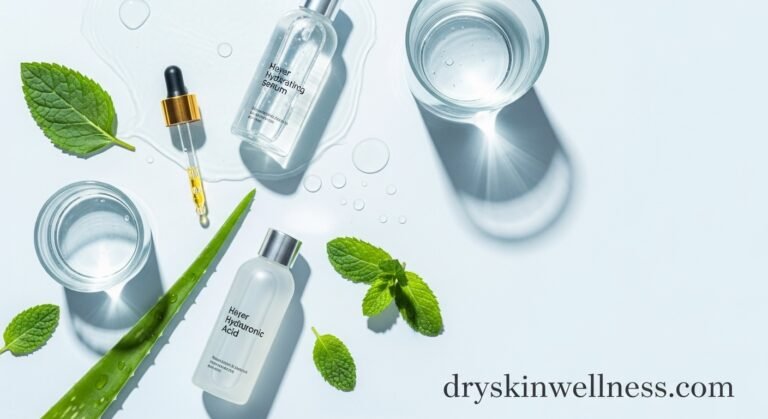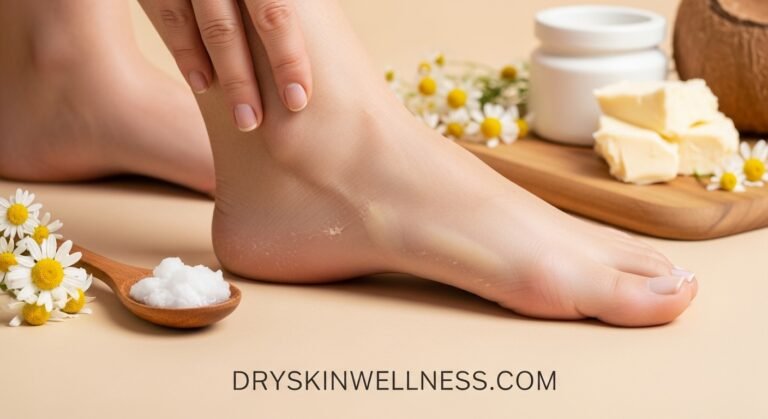Why Is My Skin So Dry Even When I Moisturize
Every inch of our skin deserves the best possible care all the time. Yet, for many of us, the quest for adequately moisturized skin seems like a never-ending battle against the elements, genetics, and, sometimes, our skincare routines.
If you’re tuning into this dry skin dilemma, you probably wonder, “Why is my skin so dry even when i moisturize?” It’s a question that goes beyond the superficial (pun intended). Let’s dive into the depths of dermal hydration to unravel the complexities of dry skin and uncover the moisturizing secrets your skin has been thirsting for.
Understanding Dryness: The Culprits Beyond the Obvious
Dry skin is more than just a lack of surface moisture. It’s the result of several nuanced factors playing out in a delicate balance or an imbalance in the case of dry skin.
First, let’s address the environmental assailants. These could include climatic conditions, like low humidity, high winds, or extreme temperatures, which can strip the skin of its natural oils and moisture.
Beyond nature’s influence, genetics also play a significant role. Some individuals are born with skin naturally inclined to be drier due to their genetic makeup. This typically entails a weaker skin barrier, which leaves water to escape more easily and environmental irritants to penetrate more readily.
Lastly, there’s the almighty skincare routine—your day-to-day habits can dictate your skin’s baseline health. From harsh cleansers that strip the skin to over-exfoliation that thins out the protective barrier, our good intentions can sometimes pave the path to dry skin hell.
The Skincare Essentials: Laying the Foundation for Hydration
Why is my skin so dry and itchy? It’s a crucial question asked by millions of people. Embracing a robust moisturizing regimen is crucial, but first, it’s important to understand the essentials.
Let’s start with the skin’s barrier, the unsung hero in the tale of moisture retention. The skin barrier protects the body from the onslaught of environmental stressors, and when it’s compromised, dryness can become a constant companion.
Moisturizing Basics
Unraveling the Types of Moisturizers
- Creams: Rich in texture, these are excellent for the face and body, especially during the colder months.
- Lotions: Lighter in consistency and often more fluid, they’re suitable for daily use and under makeup.
- Oils: These can be used alone or mixed with your regular moisturizer, delivering potent hydration and nourishment.
The Ingredients to Seek Out:
- Humectants: Think of ingredients like hyaluronic acid and glycerin—they attract and hold moisture from the air.
- Emollients: These are the heavy-lifters in smoothing and softening the skin. Look for ingredients such as squalane or shea butter.
- Occlusives form a protective layer on the skin to prevent moisture loss. Common occlusive ingredients include petroleum jelly or dimethicone.
Proper Application Techniques:
- After cleansing, pat the skin lightly with a towel, leaving it slightly damp.
- Apply the moisturizer using gentle, upward motions to avoid tugging on the skin.
- Don’t forget that your neck and décolleté deserve the same attention as your face.
Common Moisturizing Missteps: And How to Navigate Around Them
Despite the best intentions, we can often sabotage our skin’s hydration subtly. It pays to become acquainted with these potential missteps to ensure your moisturizing efforts work with your skin, not against it.
Overlooking Specific Areas:
Some areas of the body are prone to dryness due to the lack of oil glands. These often neglected zones include the elbows, knees, and heels. Paying extra attention to these areas with richer moisturizers can make a visible difference in their texture and appearance.
Incorrect Product Pairings:
Layering on products that don’t play well together can reduce the efficacy of your moisturizing routine. For example, using a water-heavy serum over an oily moisturizer may not allow the serum to penetrate the skin effectively. Always research or consult a dermatologist if you need clarification on mixing certain products.
Not Addressing the Core Issue:
Sometimes, dryness can signal an underlying skin condition like eczema or psoriasis. In these cases, a specific treatment plan from a dermatologist could be a game-changer. It’s essential to treat the root cause, not just the symptoms.
Lifestyle Factors Contributing to Dry Skin:
An imbalance or deficiency in your diet, insufficient water intake, exposure to cigarette smoke, or spending too many hours in dry, temperature-controlled environments can all lead to moisture-parched skin. Addressing lifestyle factors can improve skin health and help your moisturizer work more effectively.
Layering for Optimal Hydration: A Step-by-Step Guide
Layering isn’t just for wardrobe enthusiasts; your skincare routine can benefit from a thoughtful multi-layer approach.
The Correct Order of Application:
- Start with the lightest consistency product, such as a toner or serum, which can penetrate the skin more effectively.
- Follow with a heavier moisturizer, then seal it all with an occlusive if necessary.
Pro Tip: Remember to apply sunscreen as the last step in your morning routine, on top of your moisturizer, to protect your skin from UV-induced dryness.
Tailoring Your Regimen:
Your skin’s needs can change with the seasons or due to various lifestyle factors. A tailored approach that adjusts to these changes can help maintain optimal hydration levels. For example, in the summertime, you might need to switch to a lighter moisturizer, or in the winter, you might need to apply your occlusion more liberally.
Nighttime Moisturizing Habits:
The skin rejuvenates at night, making it the perfect time for your moisturizer to work magic. This is the time to bring out those heavy-duty creams or oils that deeply nourish and repair the skin barrier. A night cream or an overnight mask can be especially beneficial for locking in moisture.
Advanced Strategies for Stubborn Dryness
For those with persistently parched skin, standard practices may need a bit of a boost. The following advanced strategies can help you navigate through the driest of times.
Hydration from Within
Hydrating foods like cucumbers and watermelon can boost your diet’s moisture. Foods high in omega-3 fatty acids, such as salmon or flaxseeds, can also contribute to the health of your skin.
Advanced Ingredient Formulas
Look for moisturizers with advanced ingredients like ceramides, which help to strengthen the skin barrier, or retinol, which can increase cell turnover and improve the skin’s ability to retain moisture.
Regular Exfoliation
Exfoliating can remove dead skin cells that prevent your moisturizer from penetrating deeply into your skin. Opt for a gentle exfoliator and ensure you’re not overdoing it, which can lead to further dryness.
Humidifiers
If your home environment tends to be dry, using a humidifier can help add moisture back into the air, which can also benefit your skin.
FAQ
Q. What should I look for in a moisturizer?
A. A good moisturizer should contain ingredients that help to hydrate and nourish the skin, such as hyaluronic acid, glycerin, ceramides, and dimethicone. It should also be suitable for your skin type.
Q. Can I use the same moisturizer all year round?
A. Adjusting your moisturizer according to the changing seasons and your skin needs is best. You may need a richer, more emollient formula in the winter, while a lighter lotion or gel may suffice in the summer.
q. Can dry skin be cured?
A. While there is no permanent cure for dry skin, addressing underlying issues and maintaining a consistent skincare routine can significantly improve. It’s essential to consult a dermatologist if dryness persists or is accompanied by other symptoms.
Final Thought
Why is my skin so dry even when I moisturize? Here is a complete solution for hydrated skin. Pursuing soft, plump, and thoroughly hydrated skin might seem elusive. Still, it’s well within your reach with an understanding of the underlying issues, a commitment to a solid skincare routine, and a few tips and tricks to adjust course as necessary.
Consider the broader picture the next time you wonder why your skin is still dry despite your moisturizing efforts. Environmental factors, genetics, and your skincare routine all play a part. By addressing these factors with intelligence and care, you can turn dry skin woes into a thing of the past. Remember, the road to well-moisturized skin is a marathon, not a sprint. Embrace the journey and revel in the transformation. Your skin—the one you’re in for life—will thank you.


